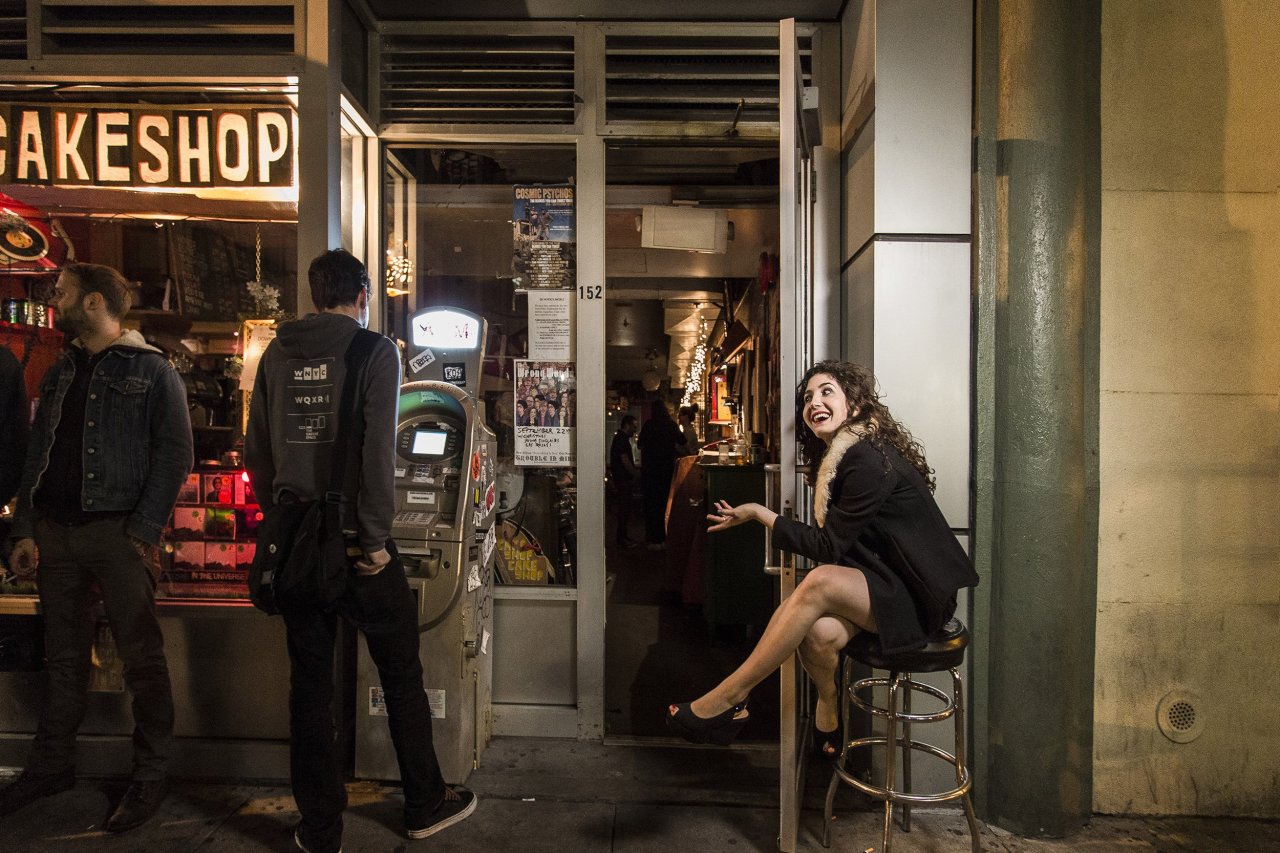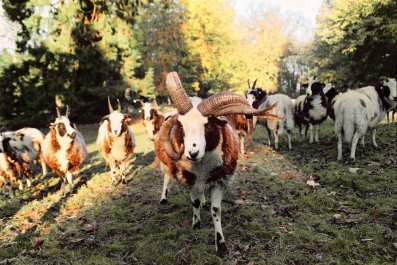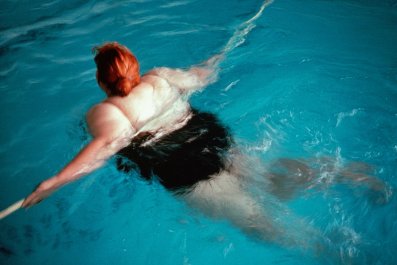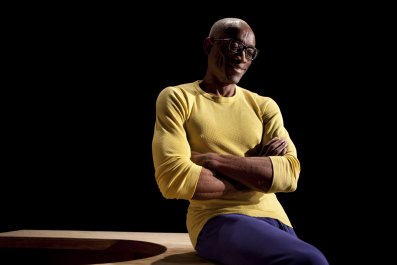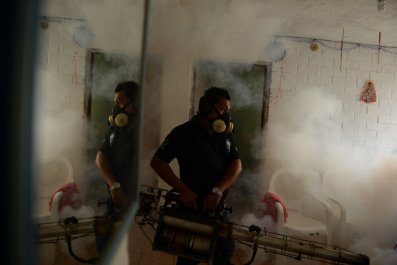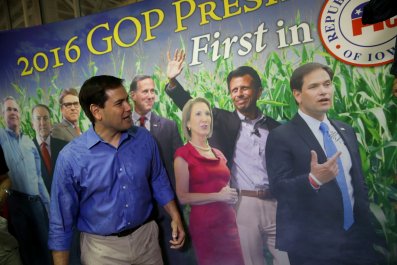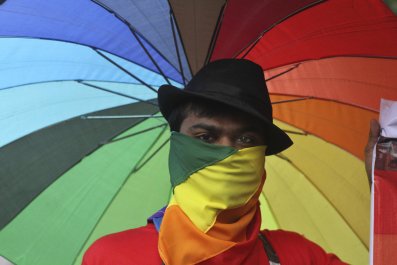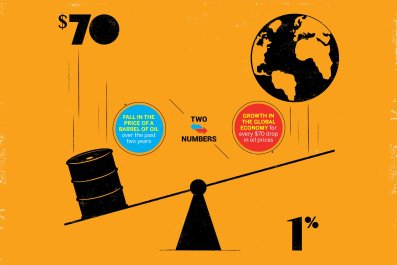When Kate Berlant prepares to do stand-up, she's also preparing for what could become a stream-of-consciousness monologue, a piece of dinner theater or an interrogation. ("Do you guys steal?" she once probed audiences. "No one steals? Just a room full of nerds?") A comedian and actress based in Los Angeles, Berlant employs her sardonic, surreal humor to toy with what are typically comedy no-nos, like prolonged silences and lines that elicit nervous chuckles instead of big laughs.
Though she flexes a master's degree in performance studies from New York University and often sends up feminist causes célèbres, her jokes aren't aimed just at gender-fluid Ph.D. students from Brooklyn (though they find her hilarious). Instead, she lovingly skewers the "TED Talk and Tumblr" demographic by embracing its phony, postmodern musings. (Gesturing toward an air conditioning unit near the stage at a New York gig, she once pondered, "Isn't it amazing how you can be so close to technology and so alienated by it?")
Berlant says lately she's been taken with something more ephemeral than air conditioners: clairvoyance. Back in the fall, I was witness to how Berlant has been subverting improv comedy's traditional crowd-work gimmicks. She morphed a sold-out gig at the Bell House in Brooklyn into an immersive psychic reading. The supernatural stint is, I imagine, informed by her experiences working for a crystal healer when she lived in New York, as well as her ability to, as she puts it, "gently hallucinate things."
The approach doesn't always work, but occasionally fortune falls in her favor, like when she correctly guessed the December 3 birthday of an audience member at a recent performance. "Reality is so slippery, and it's kind of fun to entertain that slippage," Berlant tells Newsweek. The bit succeeds, she says, mostly because she thinks it does. "It's a belief system," Berlant says. "I think I'm psychic, so if I believe it, you'll believe it."
Berlant has carved out a particular (and particularly indefinable) spot for herself within the ever-widening space in comedy known as "experimental humor." It's a place where a comedian can forgo musing on airplane food and instead take on the role of a peppy yoga ball salesperson in a dystopian future. The avant-garde comes naturally to Berlant, who says growing up as an only child she had "to invent things to be entertained."
Like an imaginary friend? She shakes her head. "I had lies," she says. "I told a friend when I was older, like 13, that I had a brother. And was like, 'My brother Adam? He's the worst.' Then forgot about that lie. Then she came over and was like, 'Where's your brother?' And was like, 'I don't have a brother.'"As a child, she says, she was "a little bit pathological," but she insists that these yarns weren't spun maliciously. "I convinced people I was Curly Sue from the movie," she chuckles. "Talk about conjuring reality."
Recently, she found what might be the first Kate Berlant show ever recorded on film: a tape of herself as a baby doing impressions of her dad. "I can't talk, but I strike this pose three different times," she says. "It's really eerie, because it does look exactly like him."
As a teenager, she wrote her first formal jokes about the pope, of all subjects. "The pope was never mentioned in my house," Berlant says. "I think it was me being like, 'What's comedy? Dethroning the king of whatever. It's the ultimate power structure. Which one can I defame?'"
A Kate Berlant show often feels like a class in exploring the transaction between audiences and the performer they're watching. It's a framework that first interested her while pursuing her master's degree, which she nearly saw through to the Ph.D. level. "Performance studies is all about performance and stretching that—what does that mean? How do we perform gender and race? It really gets in your head," she says. "I started getting fascinated with how, weirdly, stand-up specifically is this kind of performance that's associated with total freedom, right? And it can end up feeling so restrictive."
Stand-up comedians often have delusions about the nature of performance. Often, stand-ups just starting out feel they have to try to crack the universal joke ("I remember being told early on by a booker, 'You gotta make 'em laugh on Main Street, and you gotta make 'em laugh in the basement,'" she says), or attempt to cram as many jokes in 20 minutes as possible, 30 Rock–style.
But in many comedians' desire to fill a space with nonstop laughs, there remains little room for audiences to absorb any kind of subtext. "There's not supposed to be those moments [of silence] in comedy," Berlant says. "But that's what I'm most interested in."
That's not to suggest that being funny isn't still the goal, but it's not something Berlant lets inhibit her from the ultimate aim of her sets: engaging audiences in abstract ways. "I think it can be useful to try to weaken that voice in your head that says, 'Always go for the laugh,'" she says.
Her tendency to lean toward the avant-garde separates Berlant from the rest of the stand-up pack, but it's also what may push her into the mainstream. In March, she'll be starring in the Netflix special The Characters, which has allotted eight standout comedians a 30-minute episode of television with zero restrictions. She's also set to appear this year in Dean, a dramedy directed by fellow comedian Demetri Martin, and on Animals, an HBO show created by the Duplass brothers. That's not including several in-the-works projects she's planning with her frequent collaborator John Early, including a miniseries.
"I've experienced this [situation] where people don't know where to put me in the narrative: I'm not the hot, main heartthrob girl, but I'm also not the ogre from two towns over," she says. "Why does one body onstage make you feel comfortable, and then others make you tense up, or feel that confusion isn't permissible in the encounter between comic and audience? Shouldn't we disrupt that consumption?"



